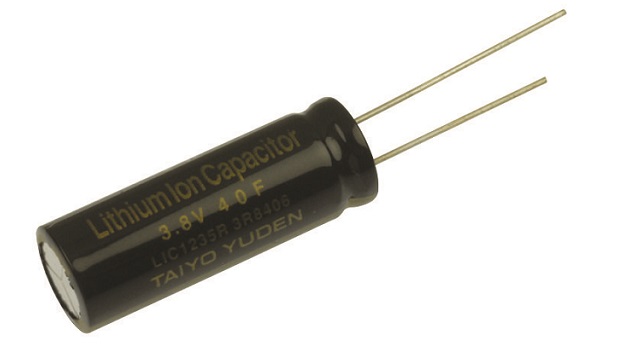Lithium ion capacitor devices by Taiyo Luden offered, that combine super-capacitor and lithium ion storage to create a component with twice the storage capacity of its own super-caps, a 3.8V terminal potential, and long cycle life.
Operation is over -25 to 85℃ (voltage caveats above 70℃), and the firm will offer four versions: 20, 40, 100 and 270F.
“It has superlative safety characteristics,” said Taiyo. “Since the amount of self-discharge is small, self-ignition becomes extremely unlikely.”
“Compared to existing capacitors, the energy density is high, a large reason for this is the fact that the static electricity capacity of the negative electrode is increased by pre-doping,” said the firm, also pointing out that this means the capacitors arrive pre-charged, and capable of delivering high currents into accidental short circuits.
According to product developer, Ishida, the firm had two use cases in mind Li-ion caps: “The first was to use the high power density to develop a high-volume capacitor for use in energy recovery, or as a back-up, for automobiles and industrial machinery The other aim was to develop a low-volume capacitor, that could be used in consumer devices such as smartphones, tablets, mobile phones, digital cameras and PC’s.”
Most of the uses seen so far, according to the firm, is as back-up for rechargeable batteries, delivering high instantaneous power while the battery provides high capacity. Medical appliances is one application, where even momentary voltage drops can be critical. Automotive energy recovery is foreseen, as well as energy recovery in lifts (elevators). “In addition, lithium ion capacitors have started to be used by themselves in a standalone role instead of rechargeable batteries in some applications,” said the firm.










